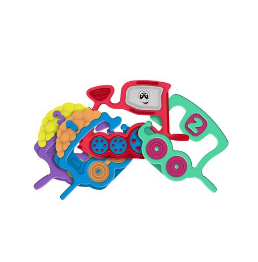Selecting the right toys for children can significantly influence their development and overall growth. Each stage of early childhood, from infancy to preschool years, comes with unique developmental milestones that toys can help nurture. Understanding these stages and the types of toys that align with them is essential for fostering creativity, cognitive skills, and emotional growth. Here’s a comprehensive guide on how to choose the right kids toys for different developmental stages in early childhood.
Infancy (0-12 Months)
Developmental Focus
During the first year, infants experience rapid physical and cognitive growth. They develop motor skills, sensory awareness, and early social interactions. Toys that promote these skills are crucial during this stage.
Recommended Toys
- Soft Rattles: Lightweight and easy to grasp, rattles help develop fine motor skills and auditory senses.
- Mobiles: Colorful and dynamic, mobiles engage visual tracking and provide sensory stimulation.
- Teething Toys: Made from safe, soft materials, these toys soothe gums and promote oral development.
- Activity Gyms: These encourage tummy time and gross motor skills while providing sensory experiences through textures and sounds.
Toddlerhood (1-3 Years)
Developmental Focus
Toddlers are exploring their environment, enhancing their motor skills, and beginning to develop language and social skills. They are also starting to engage in imaginative play.
Recommended Toys
- Building Blocks: These foster fine motor skills and spatial awareness while encouraging creativity and problem-solving.
- Push and Pull Toys: Ideal for developing gross motor skills, these toys encourage movement and coordination.
- Shape Sorters: These toys enhance cognitive skills and problem-solving abilities by teaching shapes and colors.
- Pretend Play Sets: Kitchen sets, tool kits, or doctor kits promote imaginative play and social skills as toddlers engage in role-playing.
Preschool Age (3-5 Years)
Developmental Focus
Preschoolers are refining their motor skills, expanding their language, and learning to cooperate with others. They engage in more complex imaginative play and start to understand basic concepts of numbers and letters.
Recommended Toys
- Art Supplies: Crayons, markers, and modeling clay foster creativity, fine motor skills, and self-expression.
- Puzzles: Age-appropriate puzzles enhance cognitive skills, hand-eye coordination, and problem-solving.
- Board Games: Simple games teach turn-taking, patience, and social interaction while introducing basic math and reading skills.
- Building Sets: Larger construction sets like LEGO or magnetic tiles encourage creativity, engineering skills, and spatial reasoning.
Early School Age (5-7 Years)
Developmental Focus
Children in this age range are building on previous skills, focusing on learning to read and write, and developing critical thinking and social skills. They enjoy more structured play and group activities.
Recommended Toys
- STEM Kits: Science, technology, engineering, and math kits stimulate interest in these fields and encourage problem-solving.
- Educational Board Games: Games that incorporate reading, math, or strategy help reinforce academic skills in a fun way.
- Musical Instruments: Instruments like keyboards, drums, or xylophones promote creativity and develop an understanding of rhythm and sound.
- Sports Equipment: Balls, jump ropes, or other sports gear encourage physical activity, coordination, and teamwork.
Tips for Choosing the Right Toys
- Safety First: Ensure that toys are age-appropriate and meet safety standards. Check for small parts that could pose choking hazards for younger children.
- Educational Value: Look for toys that promote learning in areas such as math, science, language, and social skills. Open-ended toys that stimulate creativity are often the best choice.
- Durability: Choose high-quality toys that can withstand rough play, especially for toddlers and preschoolers who are still developing their motor skills.
- Encourage Imaginative Play: Toys that allow for role-playing or creative expression can help children develop important social and cognitive skills.
- Adaptability: Select toys that can grow with your child or be used in multiple ways, promoting long-term engagement and learning.
Conclusion
Choosing the right kids toys for different developmental stages is essential for supporting your child’s growth and learning. By selecting age-appropriate toys that foster essential skills, you can create an engaging and enriching play environment for your child. Remember, the best toys are those that not only entertain but also challenge and inspire your little ones, helping them thrive during their crucial early years.
